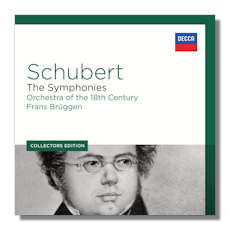
The Internet's Premier Classical Music Source
Related Links
- Schubert Reviews
- Latest Reviews
- More Reviews
-
By Composer
-
Collections
DVD & Blu-ray
Books
Concert Reviews
Articles/Interviews
Software
Audio
Search Amazon
Recommended Links
Site News
 CD Review
CD Review
Franz Schubert

The Symphonies
- Symphony #1 in D Major, D. 82
- Symphony #2 in B Flat Major, D. 125
- Symphony #3 in D Major, D. 200
- Symphony #4 in C minor "Tragic", D. 417
- Symphony #5 in B Flat Major, D. 485
- Symphony #6 in C Major "Little C Major", D. 589
- Symphony #8 in B minor "Unfinished", D. 759
- Symphony #9 in C Major "Great", D. 944
Orchestra of the 18th Century/Frans Brüggen
Decca Collectors Edition 4787839 4CDs 246m DDD
This is more of a courtesy review for consumers than a "new" review. Gerald Fenech reviewed this set in 2007 as Philips 4757955, and now it appears within the grammatically questionable "Collectors Edition" line. Mr. Fenech and I have never exactly seen eye to eye – though I have been reading his work long before I started writing here – but here we agree on mostly everything. Even his recommendations for alternative recordings (Bohm, Beecham, etc) strike me as very good, and I have nothing to contradict his praise of the early symphonies in particular.
Brüggen always conducted with great taste. His readings contained an unusual amount of polish and beauty, despite the fact he used "period" forces. He was also comfortable retaining the elegance and poise of the Classical era, which made his Beethoven and Haydn compelling even for critics who weren't on the Historical Informed bandwagon. Schubert is somewhat different, because – like Beethoven – his later work is less in the Classical vein and more Romantic. Conductors who cannot make the adjustment in approach often find the concluding numbers in their Beethoven cycles to be lacking, and the same can be said of Schubert. Happily, Franz Brüggen was too musically intelligent to fall victim to this problem. As I said, the early symphonies are excellent, but so are the later ones.
The "Unfinished" impresses for the rawness of expression in the 1st Movement, and lyric grace in the second. Happily, very little of this rawness is tonal. Brüggen inspires his orchestra to play with a winning mix of refinement and strength. Like the conductors' Beethoven cycle within this same reissue series, the focus is on the musical value as opposed to period style. In both cases, this strikes me as a very wise choice. The cycle feels cogent and well-considered instead of a project that throws period instruments in your face. And the "Great" actually sounds like it, despite not being a work that responds especially well to a "period" approach. Still, there is so much here to enjoy.
My only reservation concerns the fact that the music really does sound better on modern forces, no matter how carefully Brüggen works to convince us otherwise. In many ways, this is far more fresh that Bohm in Berlin on Deutsche Grammophon. It's less clipped than Abbado's well-liked set on the same label, and less idiosyncratic than Harnoncourt on Teldec. The fact remains that these pieces simply work better with the traditional approach, to say nothing of exceptionally fine individual performances of each symphony. That said, Brüggen makes an excellent case for this particular style, and at the low price, you can certainly decide what you like on your own.
Copyright © 2015, Brian Wigman





















